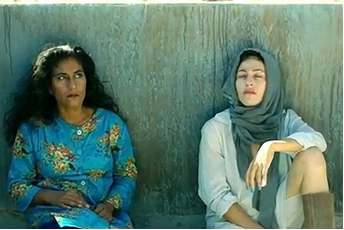Israeli director and writer, Shira Geffen, displayed her most recent feature film ‘Self-Made’ at the Jerusalem Film Festival on July 17th. Her film Meduzot (The Hebrew word for Jellyfish) which she made with her husband, writer Etgar Keret, won the Camera d’Or prize at the Cannes Film Festival in 2007.
Shira Geffen’s ‘Self Made’ is a dark but humorous drama that focuses on the “self-made” identity of the two female protagonists, Michal and Nadine. Their all-to human characteristics are revealed against the backdrop of the Israeli-Palestinian conflict. Michal (Sarah Adler) is a famous Israeli artist with an art exhibition coming up at the Venice Biennale. Nadine (Samira Saraya) is a Palestinian woman living with her family in a refugee camp in the West Bank and working in Israel at an Ikea style furniture company, Etaca, packing screws.
The film opens with Michal sleeping soundly when suddenly her bed breaks, and she falls, causing her to bump her head. After this incident, Michal realizes she is forgetting things, not only is she forgetting what she does, but also who she is. Despite people showing up at her house wanting to interview her about her upcoming exhibit, Michal’s main obsession is her broken bed. After ordering a new bed from Etaca and desperately trying to assemble it, she is dismayed to find there are only four, and not the required five screws in the Etaca bag. After an angry conversation with Etaca’s manager, Michal is sent numerous gifts and another screw in consolation for the apparent mistake (she later discovers the missing screw laying on the floor).
Helpless at the Checkpoint
Nadine, as a result of Michal’s call of complaint, is fired from her low skilled and low paid job. Her job security, like those of many other Palestinian day-workers working in companies inside Israel therefore is at the whim of a customer’s complaint and subject to the boss’s power to dispose of employees at an impulse. After Nadine loses her job, her brother decides she must leave the refugee camp and live with their aunt in Kuwait. Once at the checkpoint, Nadine’s brother gets into a fight after which he is arrested by an Israeli soldier. Nadine is forced into a holding area, watching helplessly as a soldier is shooting at her brother’s feet. A young blond-haired soldier assures the panicky Nadine that the shot fired is nothing but a rubber bullet which hurts, but does not kill. As Nadine is sitting in the holding area under the blazing sun, Michal wonders into the checkpoint, confused and lost.

Nadine (On left) and Michal (On right) sitting in the holding area at the checkpoint / Image: http://www.screendaily.com/pictures/636xAny/2/0/9/1189209_Self-Made-pink-headphones_c.jpeg
Here, the film then begins to veer from reality as the two women trade lives after a soldier’s error. He mistakenly drives Nadine to Michal’s house in Jerusalem, while Michal is left to wonder into Nadine’s home in the refugee camp. No one seems to notice the switch, and by some fanciful twist, they slip into each other’s lives without complication. It seems that even though these women have different cultural ideals and contrary physical appearances, they are essentially the same, both alienated and lost in their own lives, yet both searching for their identities.
We are all still human beings, flawed, imperfect, real
Certain themes continuously reemerge throughout the film. Although some of the brilliance of the film is lost in the illusory and slightly nonsensical plot, it touches on some key points in the Palestinian-Israeli conflict. The film shows the vulnerability of the characters and their individual characteristics which are personal and relatable. For example, Nadine, who usually looks sullen, shows her more intimate side as she dances while listening to her pink headphones on the way to the checkpoint. Michal, after losing her memory, keeps trying to find traces of her past identity and is bewildered by her own past self as she sees her own art exhibit and tries to recapture who she was. These humanistic qualities displayed by Michal and Nadine show the audience the similarities between the people on both sides of the Palestinian-Israeli conflict. People tend to lose sight of the fact that no matter the political circumstance, we are still all human beings.
Furthermore, the blond haired checkpoint soldier is shown to eagerly anticipate her 20th birthday that she intends to celebrate with her boyfriend. However, when her commander says she is not allowed to leave, she is devastated, and turns her gun on the Palestinians who are laughing at her tears. She, like other soldiers, shows her vulnerability and sensitivity which can cloud her judgment and potentially lead to detrimental consequences. Her boyfriend ends up bringing her a cake for her birthday at the checkpoint. As they sit looking at the birthday candles, he asks if she hopes for peace in the Middle East, and she laughs, “What do I care? I’m out of here in a week.” While she has the privilege to leave, many cannot.

Nadine at the checkpoint listening to her pink headphones /Image: http://www.screendaily.com/pictures/636xAny/2/0/9/1189209_Self-Made-pink-headphones_c.jpeg
In a way, the struggle for identity is what lies at the core of many ethnic conflicts. Nadine, who is rebellious and spacy, and Michal, who is confused about her own identity, seem like an unlikely match for a life swap. That, however, is one of the many beauties of the film. It focuses on people that engage the audience as they are flawed and real. What we can take from a film like this is that even in a conflict zone, people must learn to understand the other side and realize we are all the same; regular, imperfect, flawed humans living life and trying to understand the world around us.
